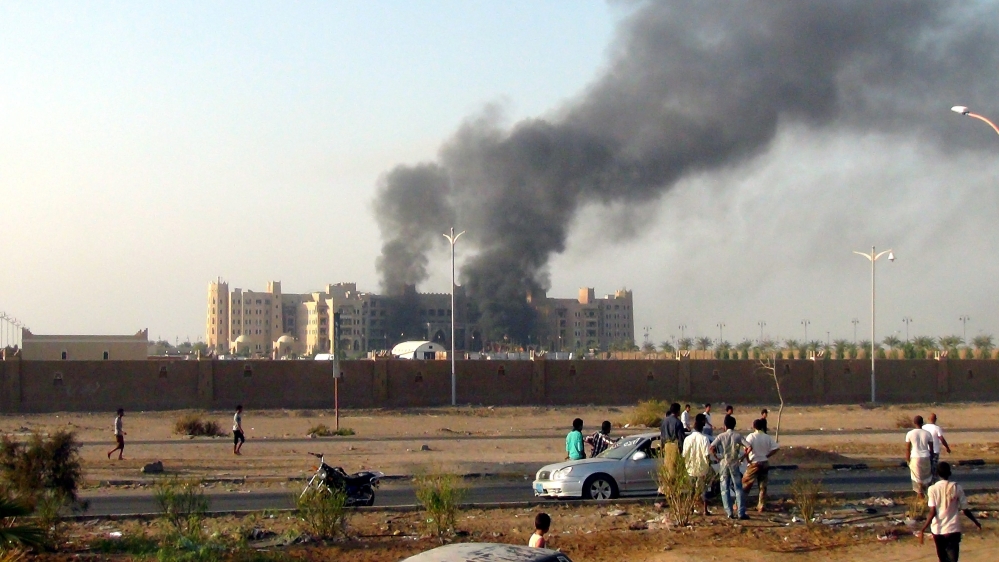Unrest and violence in Yemen's second city has spurred authorities to clamp down on arms ownership.
In the streets of Aden, people have many reasons to be sceptical about the government's ability to restore peace to the battered city.
Al-Qaeda and Islamic State in Iraq and the Levant (ISIL) fighters, who went unnoticed in the past, are now audaciously driving their armed vehicles around the city, passing army checkpoints.
"There is no one force to say it is in full control of the entire city," Mohammed Haidan, a resident of Aden's Sheikh Othman district, told Al Jazeera. "In Aden, there are all kinds of militants."
Haidan is, nonetheless, optimistic, saying that "a strong state can purge them from the city".
In a move aimed to improve security in Yemen's second city, government forces have begun carrying out a long-awaited plan to clamp down on the proliferation of armaments.
According to security officials, the plan includes a week-long awareness campaign to convince people to keep their guns at home, the setting-up of more checkpoints, absorbing local militiamen who fought the Houthis into the army and raiding rebels' hiding places in the city. The United Arab Emirates, which has a strong military presence in the area, will fund the plan.

Aden has been racked by armed clashes, explosions and assassinations since the Houthi rebel group was pushed out of the city in July, despite the deployment of thousands of pro-government forces.
There is no one force to say it is in full control of the entire city. In Aden, there are all kinds of militants.
|
Brigadier-General Mohammed Mousaed, Aden's security chief, told Al Jazeera on Monday that the plan would include the setting-up of more checkpoints manned by anti-Houthi militias, pro-government members of the Yemeni army, and soldiers from the coalition of Arab countries supporting Yemen's government against the Houthis.
"We have received solemn directives from the governor of Aden to confiscate arms. We want to make the city a paragon of modernisation," Mousaed said.
Abd-Rabbu Mansour Hadi, the Yemeni president, made Aden the temporary capital of Yemen after fleeing Houthi-controlled Sanaa earlier this year. He was later forced to flee Aden as well after Houthis invaded the city. He decamped to the Saudi capital of Riyadh, along with other high-ranking government members.
Mousaed conceded that the process of disarming people would not be easy. "People have come out of a war and weapons are everywhere," he said. Yemen has one of the highest rates of gun ownership in the world.
A Yemeni security official told Al Jazeera that an awareness campaign would precede the crackdown on arms.
"For one week, we would warn people from carrying their arms in public," he said. "After that, security forces would confiscate weapons of those who do not cooperate."
Since most government members returned to Aden in September, the internationally recognised Yemeni government has assured residents of its ability to restore peace and calm.
The city has, however, witnessed a string of deadly attacks. In October, for example, a local branch of ISIL claimed responsibility for twin attacks on a hotel housing the government and serving as the command centre for the UAE's military forces, in which 15 soldiers were killed.
After the attack, some of the ministers returned to Riyadh.
Khaled Bahah, the Yemeni vice-president, said in a subsequent press conference that his government and security forces were "increasingly determined" to confront armed groups in Aden.
But as an indication of just how insecure the city remains, Bahah, rather than fly to Riyadh via Aden's airport, opted to take a boat to Djibouti and proceeded from there to the Saudi capital.
The security official played down the threat, saying that government forces were tracking fighters' locations. "We know their names and their addresses and can quickly snatch them," he said, adding that the priority was building robust security forces.
Meanwhile, Aden residents have complained that armed groups sometimes suddenly clash with one another in the streets and go unpunished when they kill civilians.
Heavy gunfire during wedding nights, a new phenomenon in Aden, is linked to the spread of arms and is responsible for many deaths in recent months.
Before the clampdown on guns, the Yemeni government had taken other measures to calm the situation. Hadi ordered security forces in Aden to absorb thousands of anti-Houthi fighters into the police and army.
Local security officials told Al Jazeera that a list of eligible fighters who would join military training camps had been finalised, while the UAE had agreed to support the process with money and expertise.
And in October, Hadi appointed an army general, Jaafar Muhammad Saad, as the new governor of Aden province. Saad is a well-respected military officer who co-planned the operation to retake Aden in July.
However, locals say they will continue to feel nervous about security until the exiled government resumes its duties in Aden.
"We feel scared about security lapses like sudden arbitrary shootings," said Saleh Khaled, a teaching assistant at Aden University, who lives in Aden's Khormaksar district.
"The level of arms possession is unprecedented, especially among young people. Checkpoints are everywhere, but armed men go unchecked. We are used to hearing skirmishes between armed groups, especially at midnight."
Source: Al Jazeera






0 Comments